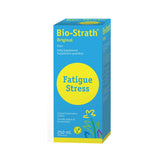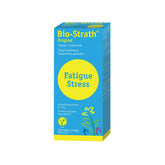Situations that are new or difficult to accept or control affect our nervous system as much as our physical integrity. The word 'stress', coined in the 60s by the Austrian neurologist Hans Selye, comes from the Latin 'strictus', meaning tense, tight, stuck in a vice, and aptly illustrates the muscular and nervous tension we feel in situations of alertness and urgency. This state of alertness came in very handy when we lived in the woods and had to be quick to flee the bear in pursuit.
Today, the context is certainly very different, since the stakes are more at the level of cerebral performance, such as carving out a place in society and keeping it. What's more, it's almost impossible to avoid all forms of stress, as no one is immune to the unexpected. And it would seem that modern man loves this state, that adrenaline rush that makes him feel alive.
On the other hand, it's this continuous stress that makes us suffer, and this constantly circulating adrenalin that exhausts us. Chronic stress exhausts our beloved adrenal and pancreatic glands..2
Here's a reminder of Hans Selye's 'general adaptation syndrome'.
The reactions that define stress are in 3 phases:
- Phase 1: State of alert; the body prepares to fight or flight
- Phase 2: Resistance; the situation persists
- Phase 3: Exhaustion; situation prolongs and intensifies
Solutions for better stress management: The physiological mechanisms of stress
The pancreas and stress
The pancreas is responsible for maintaining our blood sugar balance. After a meal, it's normal for glucose levels to rise, and for the pancreas to secrete insulin to encourage glucose into the cells. At the same time, the body takes advantage of this to store glucose in the liver (glycogen), in case of an emergency. When there is a drop in glucose, such as during physical exertion or acute stress, the body reacts by producing adrenaline to bring glucose levels back to normal..1, 2
The role of the adrenal glands
When under stress, the survival hormone adrenalin sets in motion a series of physiological changes: heart rate increases, breathing quickens, blood pressure rises, digestion largely ceases, metabolism accelerates and the pancreas, whipped up by adrenalin, releases its glucagon, which in turn forces the liver to release its glycogen reserves to restore blood glucose levels.
The hypoglycemia-induced brain panic too often causes the body to produce excess adrenalin, which remains permanently present in the blood and leads to side-effects such as sweating, anxiety, tremors, dizziness and so on.
Prolonged periods of stress lead to a chronic rise in the level of cortisol (stress hormone) produced by the adrenal glands. Research now links cortisol to bone loss, chronic fatigue, exhaustion, fat accumulation, infertility and memory loss. What's more, the workload on the adrenals increases during menopause, as these glands are one of the main sources of sex hormones, including estrogen..1, 2
Visit solutions for better manage your stress: Our health tips
- Breathing is a powerful tool for combating stress. Several times a day, take the time to fill your lungs with pure air and exhale slowly through your mouth until they are empty. Repeat this exercise 5 times.7
- Sleeping 8 hours every night helps you recover and recharge.
- Drinking at least 1.5 liters of water a day helps with regular cleansing. Add to your water Concentrace (minerals and trace elements) and maintain your electrolytes.8
- Have a good diet, fruits and vegetables 7 to 10 servings, good sources of protein (vegetarian, legumes, animal, fish and organic as much as possible), nuts and oil seeds, whole grains, etc.
- Eat meals at regular times
- Avoid foods with a high glycemic index (white bread, refined sugar, sweet desserts, etc.).
- Engage in physical activity to release excess cortisol
- In your spare time, have fun!
- Live fully in the present moment.2
Visit solutions for better manage your stress: Lhe medicinal plants of choice
- Garlic: a natural, general antibiotic that boosts the body's resistance. Include it in your daily diet.
- Ashwagandha Calming tonic, it is ideal for conditions of exhaustion and hyperactivity. It can help treat anxiety.
- Oats Oat straw restores nervous health. It promotes inner calm and normalizes nervous exchanges.
- Basil Soothes feverish adrenal glands and strengthens them. Useful for exhaustion and chronic fatigue. Think of Marcello farm pesto for your vinaigrette and/or pasta.
- Holy basil is an adaptogenic plant. Visit holy basil prevents elevation of corticosterone (cortisol) levels, an indicator of high stress.
- Catnip Catnip: This plant has the greatest affinity with children. It acts specifically in cases of nervous conditions associated with very high mental activity. Catnip is a specialist in restless sleep, with many dreams or nightmares, signs of great mental activity. It promotes restful, regenerative sleep.
- Lemon balm Lemon balm: relieves nervous tension and the physiological effects of stress. It soothes nervous disorders such as anxiety, nervousness and restlessness.
- Rhodiola A master plant for cognitive health. Rhodiola has a special affinity with the brain, improving short- and long-term memory, mental acuity, concentration, attention, learning capacity and intellectual performance.
- Valerian An essentially sedative plant, valerian facilitates falling asleep and improves sleep quality, while helping to reduce the number of nocturnal awakenings. It is effective for occasional as well as frequent and repetitive sleep disorders.3
Visit solutions for better manage your stress: The formules
Stress from ViaZen
Stress from ViaZen is a complex with ashwagandha, valerian, L-Theanine and magnesium: L-Theanine is an amino acid that helps sustain attention. Magnesium is a mineral that is beneficial in cases of stress and anxiety, and acts on muscle relaxation.
Bio-Strath
Bio-Strath is a supplement containing 61 vital substances naturally present in a plant yeast called SACCHAROMYCES: vitamins, minerals, trace elements, amino acids and other basic substances provide the body with strength and vitality.
These include B vitamins, which can have a positive effect on the nervous and immune systems. Visit Bio-Strath helps promote well-being by reducing fatigue and supporting the body during periods of physical and mental stress. It's also a source of antioxidants..6
Strest from St Francis Herb Farm
Strest is an adrenal tonic featuring holy basil, Siberian ginseng, rhodiola, ashwagandha, oats and schisandra. This adaptogenic herbal formula supports the immune system and normalizes the response to stress..4
Alkapure from Pure Lab Vitamins
Stress is acidifying and depletes the adrenal glands. Alkaline therapy or pH balancing reduces latent and chronic metabolic acidosis in peripheral tissues (high systemic acidity inhibits our immune system and favors bacteria and viruses).5 Alkaline salts Alkapure pH alkaline salts can be used to relieve symptoms associated with hyperacidity.
Live healthier by taking better control of stress-related issues!
About the author
Marie Couture, Certified Naturopath
Specialized in :
- Digestive disorders
- Inflammation
- Hormonal problems
- Stress management
Sources
- Marieb Elaine N., Anatomy and PhysiologyERPI, 1999, 1194 pages
- The journal of the Guilde des Herboristes, Stress and immunity Vol. 11, Spring 2006
- https://clefdeschamps.net/fr/
- https://stfrancisherbfarm.com/
- https://www.purelabvitamins.com/AlkapureAlkalineSalts.php
- https://www.avogel.ca/fr/produits-naturels/biostrath-original.php
- https://www.youtube.com/results?search_query=coh%C3%A9rence+cardiaque+5+minutes
- https://www.traceminerals.com/product/concentrace-trace-mineral-drop








